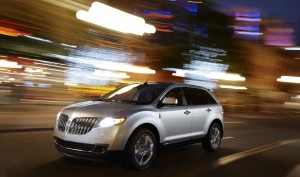
Ford's Lincoln MKX came in for criticism in the latest Consumer Reports reliability study due to technical problems with its infotainment system.
Japanese automakers dominate the latest annual automotive reliability study by Consumer Reports magazine –- while Detroit makers suffered some unexpected setbacks and European brands, including those producing some of the marker’s most luxurious products, experienced significant reliability issues, according to more than 1 million owners who responded to the survey.
Led by Scion, the low-priced, youth-oriented Toyota brand, Japanese marques captured the top nine spots in the widely-followed study. Ford, meanwhile, which had become a benchmark for Detroit’s comeback in quality, suffered a sharp decline, plunging from 10th to 20th among the 28 brands covered by the study.
“The fortunes have changed for the Big Three” overall, noted David Champion Consumer Reports’ chief of automotive testing, during a presentation to the Detroit Automotive Press Association.
Based on the results from 1.3 million surveys completed by CR subscribers, the data found Ford’s Explorer SUV, compact Focus and subcompact Fiesta models all coming in below average during their first year on the market, while several previously well-rated models dropped to below average due to a mix of problems.
Among the key issues penalizing Ford:
- Problems with the maker’s PowerShift transmission. The clutchless manual gearbox has been widely reported to have issues such as what Champion described as “strange shifts”;
- Vehicles like the Lincoln MKX, meanwhile, were penalized for problems with models such as the MyLincolnTouch and MyFordTouch infotainment systems which rely on iPhone-like touch-sensitive screens rather than conventional knobs and buttons.
Ford officials acknowledged they had problems, responding to the Consumer Reports study by contending both the transmission and infotainment systems have been dealt with through recent updates and upgrades, a statement insisting “we are largely back on track after addressing these near-term quality issues.”
The other Detroit makers also took hits in the latest CR reliability study, Champion contending General Motors “stumbled a little bit,” with several models, including both the Cadillac SRX crossover and the otherwise popular Chevrolet Cruze. That midsize sedan came in “significantly below average because of a number of small issues,” said the testing chief. On the other hand, Chevy’s critical new plug-in hybrid entry, the Volt, was “excellent in terms of reliability.”
Of all the domestic brands, the smallest showed the most marked improvement, especially with its completely updated products, like the Jeep Grand Cherokee. But Chrysler’s “older models hurt the brand,” said Champion. But the improved reliability of new offerings suggests the maker is taking seriously the need to get quality in order, he added.
Korean makers Hyundai and Kia came in “mid-pack,” said Champion, “not as good as the Japanese but in very good position,” despite some problems with a couple of models such as the Kia Sorento.
As for the Europeans, they are “not doing too well,” with only Volvo showing any real strength on the reliability front – at 10th place. Porsche suffered a severe decline, overall, though that was largely the result of problems with its redesigned Cayenne sport-utility vehicle.
At the bottom of the pack was Jaguar, which is again experience a range of issues, including mechanical and electronic technologies. The British maker’s XF sport coupe was the single worst vehicle in the study, according to CR data.
Though Scion came is as the top-rated brand that caught some observers by surprise. The Toyota division has done far less well in another oft-quoted measure, the annual J.D. Power Initial Quality Survey, where it has lagged behind industry average in recent years.
Asked about the seeming conflict, Champion suggested that reflects different methodology. The Power study, he noted, looks at design-related issues as much as the actual failure of specific vehicle parts, components and systems. The CR study, he contended, is “designed for consumers,” while he argued that the Power report is aimed, as much as anything, at helping manufacturers identify and fix problems.
But Champion conceded that no study tells the whole picture. The Lexus CT200h hybrid is the highest-ranked product according to the 2011 Consumer Reports reliability study, but when testing the vehicle for its performance, drivability and other factors, it was far less impressive, Champion acknowledging “It’s a really reliable car but we didn’t like how it (came out when) tested.”
The new CR study underscores some of the challenges the industry faces as makers are pressed to add more and more digital technology to their vehicles. Such systems, like the FordMyTouch and the BMW iDrive, have helped win over customers – but anger owners.
Sometimes, suggested Champion, that’s because makers simply take things a step too far, with ineffective voice controls or virtual touch keys like those on the Lincoln MKX.
A maker like Ford, he said, must “keep it simple as possible and don’t listen to stylists who say they should do something just because it’s cool.”

